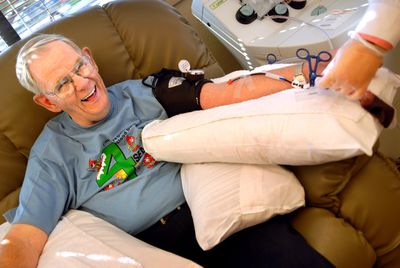His gift is lifeblood for others
Ohioan intends to donate platelets in 50 states

Al Whitney has an odd way of enjoying his retirement.
Rather than spending his days on the golf course or traveling, he’s on a quest to donate blood platelets in all 50 states. He reclined Tuesday in an overstuffed chair at the Inland Northwest Blood Center, a smile spreading across his face as nurse supervisor Dawn Beusch inserted a needle into his vein.
“Have you given blood recently?” he asked before answering any questions.
Whitney’s passion for giving isn’t drawn from personal tragedy or financial gain. He’s been at it since the 1960s, donating gallons of whole blood and more than 616 units of platelets – the part of the blood that helps with clotting.
“Go and walk through a cancer ward,” he said. “That’s why I’m here.”
Cancer patients, burn victims and organ transplant recipients are among those who often need platelets, said Judy Young, who will retire next year as chief executive officer of the blood center.
Platelets are collected through a process known as apheresis. Blood is drawn from the body and routed to a centrifuge that separates platelets from the red blood cells. The platelets are bagged, and the blood returns to the donor.
Whitney, 71, gives platelets about once every two weeks.
Washington is the 18th state in his “Platelets Across America” mission. He will spend the week in the area speaking to community groups about his cause and the importance of donating blood and platelets. Then he’ll donate in Idaho and fly home to Avon Lake, Ohio, near Cleveland.
Whitney often finances his own travels, he said, shopping for bargain airline tickets. But his trip to Washington and Idaho was underwritten by the blood center, which supplies blood products to 36 hospitals serving an Inland Northwest population of 1 million.
To keep pace with demand, the blood center collects from 150 donors each day.
Keeping a fresh supply of platelets is challenging. After donated platelets are screened for disease, their shelf life is about three days. Medical technician Diana Little explained that the bagged platelets are constantly being jiggled to ensure they don’t begin to clot.
Young said Whitney, a retired factory maintenance supervisor, represents a typical donor: He’s part of a generation that focused on community service. The blood center’s greatest challenges, Young said, will be replacing these donors – ideally with people in their 20s and 30s. The center collects about 21 percent of the region’s blood supply from high school-sponsored blood drives.
Sitting next to Whitney was 24-year-old KeLicia Shorts, a nursing student and Mead High School graduate who returned to Spokane recently after attending classes and playing volleyball at the University of San Francisco.
She started donating during college, figuring, “Why not? I’m young and I’m in good shape and maybe I can help somebody.”